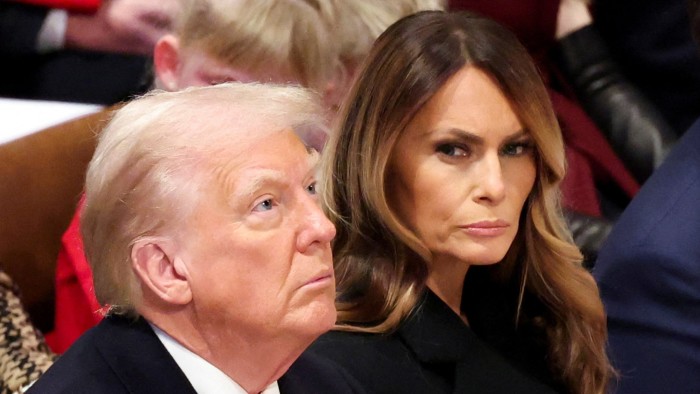The memecoins launched by President Donald Trump and his wife days before his inauguration are damaging the industry’s reputation and risk a backlash from investors, crypto executives have warned.
$TRUMP was launched by the president on Friday evening in the US and was followed on Sunday by $MELANIA. The total nominal value of both tokens initially surged over the weekend, with the president’s reaching $14.5bn and Melania’s hitting nearly $3bn.
But they have since lost more than half of their value, leading to accusations of conflicts of interest and concerns that thousands of retail investors were sucked in to trading tokens even more volatile than bitcoin.
“Call me old-fashioned but I think presidents should focus on running the country,” said Nic Carter, founding partner at crypto venture capital firm Castle Island Ventures and a Trump supporter.
“Not to mention the obvious [conflict of interest] given the fact that Trump can set crypto policy,” he added.
One big Silicon Valley investor at the World Economic Forum in Davos called Tesla boss Elon Musk and Trump “the new Crassus and Caesar” — referring to the Roman political figures who formed an alliance to further their own interests.
“We are seeing real ‘End of Empire’ stuff in the US,” the person added, pointing to the creation of billions of dollars in wealth overnight. “Human nature never changes.”
Much of the trading activity in the 200mn Trump coins available has been centred not in the US but on little known Asian-based exchanges such as BiKing, Gate.io and Megabit, according to data from CoinMarketCap.
Memecoins have no cash flow, business model or practical use underpinning their valuations. Their value is derived from their popularity, which is often as fleeting as the memes they represent.
“The Trump Memes are intended to function as an expression of support for, and engagement with, the ideals and beliefs embodied by the symbol ‘$TRUMP’,” the coin’s website states.
The Trumps’ coin launches come after the president lent his enthusiastic support for crypto during his election campaign. He promised a more industry-friendly regime for companies, after executives faced a regulatory crackdown under the Biden administration.
But many in the crypto industry are concerned that the launches threaten to further damage the reputation of a sector trying to rebuild trust after a series of high-profile frauds and collapses.
Some lawmakers, meanwhile, worry that retail traders could lose large sums of money.
“This memecoin represents the worst of crypto,” said Maxine Waters, Democratic congresswoman and member of the US House Financial Services Committee. “Trump has created a way to circumvent national security and anti-corruption laws, allowing interested parties to anonymously transfer money to him and his inner circle.”
“His economic interest is for sale,” said Oskar Åslund, chief strategy officer at AKJ, a crypto hedge fund brokerage. “There are no checks and balances here.”
Gettrumpmemes.com did not respond to a request for comment.
“I believe it hurts the industry,” Anthony Scaramucci, founder of SkyBridge Capital and former White House communications director, said during a panel in Davos on Tuesday. “I think it’s going to slow down some people in the regulatory process,” added Scaramucci, whose firm runs a digital assets fund.
The world’s most popular memecoins are tokens that refer to viral internet moments and characters — such as Dogecoin, representing a Shibu Inu dog; Pepe, representing a comic green frog; and Fartcoin.
About 80 per cent of Trump’s tokens are held by CIC Digital, a company affiliated with the Trump Organization, and a CIC co-owned business called Fight Fight Fight LLC, according to the token’s website — a reference to the attempt to assassinate Trump last summer. The companies will also receive a share of trading revenues related to the Trump token.
The tokens held by insiders will start to be unlocked for sale over the next three to 12 months.
Following Trump’s lead, Lorenzo Sewell, a Detroit pastor who spoke during the president’s inauguration, announced the launch of his own memecoin later that day.
“I need you to do me a favour and go and get that coin in order for us to accomplish the vision that God has called us to do on earth,” he said in a video online.
While Trump’s promises of crypto-friendly regulations were roundly welcomed by the industry, executives doubt the president’s enthusiasm for memecoins will benefit them in the long run.
“The immediate effect has been draining liquidity and attention away from legitimate projects working on real use cases that the industry desperately needs to prove to the world in 2025,” said Serge-Raymond Nzabandora, corporate development and finance manager at Yield Guild Games, a blockchain company.
“[Memecoins] ultimately will cost retail investors given its zero sum nature. It is unfortunately ironic as this is what [former Securities and Exchange Commission chair] Gary Gensler was trying to avoid,” he added.
Trump has vowed to “end persecution” of the crypto industry and has nominated crypto advocate Paul Atkins to run the regulator, leading many to think that scrutiny of Trump’s own coins is unlikely.
In an apparent attempt to stave off potential lawsuits, terms listed on the Trump memecoin website state that users “agree that you will not bring, join or participate in any class action lawsuit as to any claim, dispute or controversy that you may have”.
Haliey Welch, who created a memecoin called “Hawk Tuah” based on a viral internet moment, was sued late last year after investors lost money in her token. Last month, she said the lawsuit was ongoing and she was “fully co-operating” with lawyers.
“There’s no protection for retail investors in this,” Åslund added. “He’s kind of above the law which is obviously also a scary thing.”
https://www.ft.com/content/e6a776da-bd32-41d4-b093-68df8850e448


